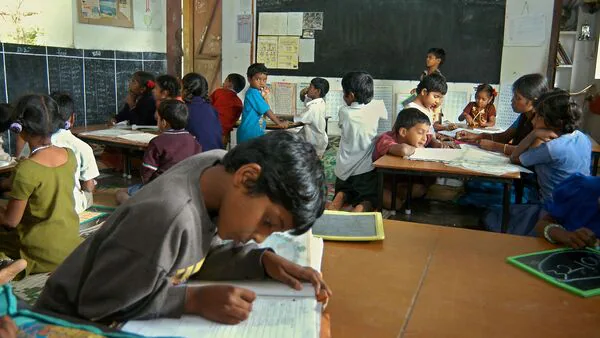
In A First, Rural Schools To Host Model Gram Sabhas To Train Youth In Democracy
The effort is aimed at“catching them young” and making grassroots democracy a lived experience for children, as per the first official.“This will not be a lecture series but a student-led exercise. The idea is to raise a generation that understands the role of Gram Sabhas in shaping village life and sees local government as a meaningful space to serve society,” the official explained. The allocated budget for the MYGS programme is ₹8.5 crore for the current fiscal year.
To make this happen, the Panchayati Raj ministry plans to rope in the ministries of education and tribal affairs to initiate the Gram Sabhas under a programme that will be broadly known as the“Model Youth Gram Sabha (MYGS),” the second official said.
Debut in 1,200 schoolsThe initiative will debut in 1,100-1,200 schools, including Jawahar Navodaya Vidyalayas, Eklavya Model Residential Schools in tribal regions, and government schools in rural areas of Maharashtra and Karnataka.
Students will act as sarpanch, ward members, and villagers, debating issues and passing resolutions on matters that affect community life, as per the officials. The Panchayati Raj ministry is developing the curriculum and modules for these mock Gram Sabhas.
“The plan is to launch it in phases. In the first phase, around 620 Jawahar Navodaya Vidyalayas and 200 Eklavya Model Residential Schools will be included. In the second phase, more schools will be added. We are also expecting participation from government schools in Maharashtra and Karnataka,” said the first official. Maharashtra and Karnataka volunteered to participate in the programme.
Also Read | India's big push for women farmers: Why small tools are a game-changerAn email query sent to the Panchayati Raj ministry, the Department of School Education and Literacy (DoSEL), and the Ministry of Tribal Affairs (MoTA) remained unanswered till press time. The states will decide whether participation in MYGS will be an extracurricular activity or if it will be integrated into the social science curriculum.
First structured attemptThis is the first structured attempt to involve schoolchildren directly in the governance processes of a village. The ministry is of the view that early exposure will build awareness among rural youth about their rights while also reviving interest in Gram Sabhas, which have often struggled with low participation.
If successful, the programme could be scaled up nationwide, making the Gram Sabha as familiar to students as the Parliament they see on television. India has about 2.68 lakh Gram Panchayats or Gram Sabhas, while the total number of villages is much higher at around 6.65 lakh.
“The Model Youth Gram Sabha would act as a potent incubator for future leadership, imparting essential skills and a strong ethical foundation that goes beyond textbooks,” said the second official.
Also Read | PM invites global investments in India's food sector, touts huge internal demandExperts say this kind of early civic education is crucial for a country aspiring to become a developed nation by 2047.“Democracies rely on active, participatory governance, and initiatives like MYGS will ensure that young people from rural and tribal regions-often the most disconnected from formal policy debates-are trained to see themselves as stakeholders in local decision-making,” said Ashish Kumar Singh, president of Citizen Forum, a civil rights awareness group in Bihar's Katihar.
“The initiative by the government is likely to foster social inclusion by making students aware of the development process at the grassroots level and would also hone their skills in becoming future leaders,” said Narmail Singh, sarpanch, Amipur block of Ambala district in Haryana.
The implementation strategy involves a phased approach, including capacity building by training National Level Master Trainers (NLMTs), who will in turn train school teachers to effectively conduct the simulation.
Legal Disclaimer:
MENAFN provides the
information “as is” without warranty of any kind. We do not accept
any responsibility or liability for the accuracy, content, images,
videos, licenses, completeness, legality, or reliability of the information
contained in this article. If you have any complaints or copyright
issues related to this article, kindly contact the provider above.


















Comments
No comment